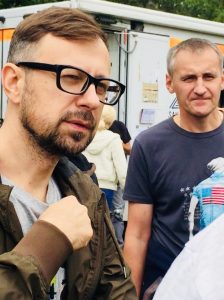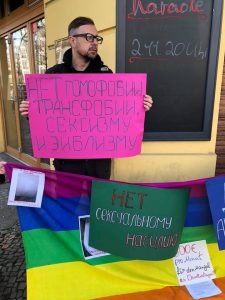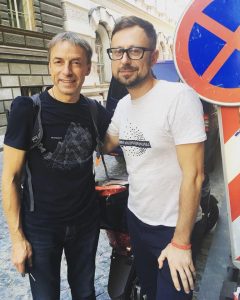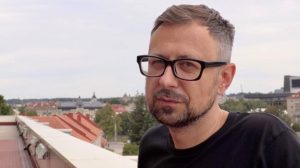EHRA presents a series of interviews with people whose names and roles in harm reduction are well known in the CEECA region and beyond. They will share the best that they have with us: their experience, ideas and memories.
Aleksander (Sasha) Levin is a Co-chair of the Steering Committee of the Eurasian Harm Reduction Association (EHRA), Specialist on Drug Policy & Information Officer at the Eurasian Network of People Who Use Drugs (ENPUD) and DUNews team member. He graduated from the Journalism Department of the Moscow State University. After graduation, he worked as a journalist in Russian mass media for over a decade. He has been involved in harm reduction since 2002. He held workshops and implemented informational activities in international and Russian CSOs, including the Eurasian Harm Reduction Network (now the Eurasian Harm Reduction Association), Russian Harm Reduction Network, UNAIDS, etc. In 2007, Sasha started working on awareness raising and advocacy in a Russian self-organization of drug users called Kolodets. In 2007–2008, he guided the development and drafting of the manifesto of drug users from the countries of Eastern Europe and Central Asia “Nothing for us without us”. He also worked in Andrey Rylkov Foundation for Health and Social Justice (ARF) as an outreach worker in Harm Reduction Moscow project. For five years, he was a school social psychologist. In 2017, he returned into harm reduction and became a member of the ENPUD Secretariat.
 – Sasha, you came into harm reduction after ten years of working in mass media. How did it happen and why?
– Sasha, you came into harm reduction after ten years of working in mass media. How did it happen and why?
– Firstly, there is no past. You cannot touch the past, put it in your wardrobe or take it to the dry cleaner’s. There is only a track of the past in our memory, in the memories of other people, in videos and photos, etc. However, there is no past on its own.
– Okay. So…
– Secondly, there is always a million ways to explain the turning points in our lives, and they are all basically right. They are like outfits, which one can put on depending on the occasion and situation. I will repeat again that all those ways are right. Provided that you do not have a goal to lie in order to sugarcoat your life or trick someone. There is no one line in life. It is not a train from a kids’ cartoon, which strictly follows its pre-determined route to get from point A to point B, with various stories happening with it on its way. Everything is much more complicated. Our life consists of many coincidences in each particular point and is basically a chain of events not related to each other, which finally define the fate of an individual.
– Could you maybe give an example?
– Let’s talk about the love at first sight. Do you believe in it?
– Let’s assume that I do. Don’t you?
– Sure, it exists, but people call it this way to make things easy. In fact, the first sight depends on your mood in this particular moment, in this part of the day, on how far you see, on whether you have a partner, on what you have eaten and drunk, on your body temperature and heart rhythm, on the music playing in your earphones and so on. For instance, you will hardly fall in love listening to a song commemorating the Great Patriotic War, but if you are listening to You’re My Heart, You’re My Soul by Modern Talking – the chances are pretty high. So if one element is missing, there magic will be gone and your life will take a different turn.
– Now I get your point. But why did you leave journalism and get involved in harm reduction?
– I have several ways to explain this situation, which basically led to this decision. The options I have are romantic, dramatic, comic and practical. If we bring it all together, the story will be as follows. I worked in one tabloid and my editor gave me a task to sneak into an intensive care ward to visit a famous actress, who had a blood stroke and a partial paralysis. I had to make a report and make photos. I coped with the task and the tabloid was sued. When I worked in mass media, I was sued about five times, so there was nothing unexpected or terrible in it. But in fact there was. I realized that I don’t want to do it anymore: sneak into the hospital wards of sick actresses, write crap about economy and politics, make interviews with strangers and weird people, including Nostradamus.
 – Did you make an interview with Nostradamus?
– Did you make an interview with Nostradamus?
– Yes, I did. In 2001, after September 11 someone found out that Nostradamus predicted this catastrophe. Then he became unbelievably popular. Back then, I worked in a newspaper and the editor’s task was for me to contact him through a medium for our economic department. I had to ask him what was going to happen with currency exchange rates, oil prices and also, at the personal request of the head of department, to find out if his wife was cheating on him.
– So did she cheat?
– Nostradamus said yes. But I lied to him not to break his heart. I mean, even with all this work there was still something human in me. So this human side of me decided to drop the journalism. At that very moment, I started dating my second wife, who was doing something useful and important, if you look out the window of the hospital ward of a dying great Russian actress. Besides, there were many secondary story lines, which all together led to my decision to work in harm reduction. If you take any of those lines out of this “soup”, the “soup” will have to be thrown down a sewer.
– Let’s talk about what you are doing now. You have been with ENPUD for two years, since 2017. Do you think that in those years the role of the community of people who use drugs changed in our region?
– I will start with saying that ENPUD is a power.
– Like Spartak is the champion? So what makes it powerful (it’s like ‘what makes you cool, bro’)?
– Bingo! It is truth as strange as it may sound. Also, the fact that there is such a network, while at the same time it does not exist. For me today it is the perfect format of work based on how the life is as I see it.
– There is no life as there is no past?
– Exactly. Nothing is steady, so if there isn’t anything steady it means there is nothing about which we can say that it exists. Your recorder consists of mechanisms and microchips, mechanisms and microchips consist of plastic and metal, plastic and metal are a sum of atoms, which split into neutrons, electrons, protons and so on, up to quanta. However, they are also not steady and consist of something. So does your recorder exist? Rather it is just a word, which names and defines the object that you hold in your hand.
 – Is it the same with ENPUD?
– Is it the same with ENPUD?
– Yes, it is. What makes us ENPUD is the name “ENPUD”. If you take it away, it will be something different. Honestly, we do not even have an office. Monday-Friday – that’s the only time, when our life crosses the lives of most people suffering in this world, who have old-fashioned jobs. In the morning, you leave your home and go to some place, where you spend your day and then go back to the starting point like everybody else. I cannot imagine how strong the motivation of people must be to suffer such discomfort every day. What kind of hidden treasures does this lifestyle offer to people? Why do they stand it? Well, I mean apart from the illusion of stability and opportunity to go with the stream, keep suffering and just exist in your shoebox without giving it a thought. In this context, drug use as well as any other dependence together with the resulting rejection, pain, prosecution, repressions and all related things – they change the focus of life and its true values greatly.
– If we go back to the community and the changes, which happened in the last two years…
– Right, sorry, I am switching to other topics all the time. About the community. Look, for many-many years we have been playing the battleship game with the government, society, law enforcers and others. We sit under cover and listen to them saying: “We increase the criminal responsibility for drug possession” (bang! – hit), “We prohibit the OST programs” (bang! – hit), “If you sell socks with the pictures of marijuana, you’ll go to jail for five years” (bang! – three-decker, sunk). By the way, those socks are a real story from Russia. But we still have many ships so we do not give up.
– So far, it sounds more like execution than like battleship.
– No, we also respond, but we are not so aggressive. We rather do fireworks: organize Support, Don’t Punish campaigns, attend the UN meetings as pet monkeys for the sake of appearance, become members of some international or national committees, where we present our heart-piercing reports. Yet it is still the “war on drugs”, so let it be a battle.
 – So you think that the community has to respond, even if it is a hopeless situation and there is no definite way to succeed?
– So you think that the community has to respond, even if it is a hopeless situation and there is no definite way to succeed?
– You know, an artist Marina Abramović had her famous performance Rhythm 0 organized in Naples in 1974, when the visitors were locked together with her in a gallery. The visitors had 72 objects at their disposal, which were selected as tools that could cause pleasure (a rose, honey, grapes, a pencil, paints, a candle), pain (a whip, scissors, a scalpel, matches) or death (a bullet and a gun). In the gallery, there was an announcement that during the performance Marina’s body will be at full disposal of the visitors and they can do anything with it as well as with the objects lying on the table. At first, people were confused and did not do anything. Then they started to get engaged in this game little by little, and their actions gradually turned into aggression. As a result, her clothes were cut, her body was pricked all over with the thorns of the rose. There were also cuts on her body, and some visitors even tasted her blood. The performance was meant to show how quickly people can go back to their wild, barbaric state, if they have a chance to do it. So this “war on drugs”, which is in fact the war with people who use drugs, means bringing people back to this wild, barbaric state. Of course, it is important to stand up against it. First, we have to make people realize that it is wrong, it should not be like this, it is not normal. Public officials who define the drug policy wear cardboard crowns from the Burger King and think that they rule the world. It’s absurd. In the old tale, just one phrase of a small boy about the emperor with no clothes was enough for everybody to wake up.
– Right, many people still think that it is fine to humiliate and persecute other people just because they use drugs or choose their partners whose lives do not go in line with the universal moral principles.
– If we talk about the last two years, the situation for communities, in particular people who use drugs, is changing. First of all, it is related to the so-called “new sensitivity” of the world, when the populations, which until recently were marginalized and stigmatized – such as various sexual and political minorities – now raise their voices. The topic of gender and feminism is relevant as never before. People speak about sexual abuse more and more and the voices of victims become louder. The #MeToo movement is the most outstanding example of the “new sensitivity” and fight for the right to live with no abuse, no stigma, no shame. Thus, people who use drugs fit into the global context, and I think that for them the situation also changes, even if the changes are not so evident. If some time ago it was a big luck to switch conversation from the concept “drug user–criminal” to the concept “drug user–sick person”, today people who use drugs are no longer happy with such status. To be “sick” also means stigma, which leads to control and repressions. Right now, it is the right moment for those, as they say in yoga, who want to “go further”. It is a chance to speak out and ruin the old stereotypes and models of behavior. We can remember this line from the song saying: “silence kills.” People have to show that they disagree with unfair treatment every day, systematically, even if it looks naive or silly. Today, people from all populations have such opportunities. We are all ready for it.
 – ENPUD and EHRA are regional organizations. Do you think that advocacy is more effective when it is done by a regional team or is it faster to achieve the results at the national level?
– ENPUD and EHRA are regional organizations. Do you think that advocacy is more effective when it is done by a regional team or is it faster to achieve the results at the national level?
– To be honest, I do not really believe in advocacy in our region. Have you even had a situation when you bring a thing home from IKEA and cannot assemble it?
– Because you lost the instructions on your way?
– No, because it is a pillow… For our public officials drug policy is a pillow. They have a different way of thinking. Rational arguments, statistics, scientific data, research results do not work for them. Even the famous “British scientists” have no power here. It is just a pillow.
– Or they bring a cabinet from IKEA, assemble it, and, as usually, they come up with a gun and a jail.
– Yeah, that’s another way to put it. For many years, we can write shadow reports, go to CND (The Commission on Narcotic Drugs – EHRA), take our officials to Western countries, show them wonderful harm reduction and substitution treatment programs, introduce them to hipster ministers and give them a day off to go shopping. All this does not make any sense in terms of advocacy. Because after such public official comes back home or closes the report on another study, he looks at the portrait of his beloved leader or teacher hanging on his wall, drops a loyal tear, crosses himself and sees the sweet word “prohibit” in his dreams. So, honestly speaking, I don’t even want to talk about it – we had it all the same 20 years ago and nothing is going to change in this regard.
– But you said that people should speak out, right?
– Yes, but not with public officials and not at the government level. We need to speak out for ourselves, to show those in power that we are not afraid of them, to become stronger and to give hope and energy to other members of community. We need to help them settle their social issues at the horizontal level, we need to defend them in courts, raise their awareness, implement prevention whenever we can, fight stigma, etc.
Our voice is also the evidence of what is going on in a certain country at a certain moment. For instance, in Moscow every time people go to street rallies, it is our evidence that the government commits crimes against the citizens of our country. I am sure there are few people in Russia today who believe that such rallies can change the situation. However, when it all comes to its logical conclusion, those in power will not be able to say: “What is the problem? Everybody was happy with the way it was. What are you complaining about?” There is a problem and people show it by going on the streets.
 – Russia makes a huge influence on the development of the regional drug policy, though substitution therapy is banned there (apart from Russia, OST is also banned in Turkmenistan). Why do you think it happens?
– Russia makes a huge influence on the development of the regional drug policy, though substitution therapy is banned there (apart from Russia, OST is also banned in Turkmenistan). Why do you think it happens?
– There is a complicated explanation and there is an easy one. The easy one is that it seems to me that the Russian authorities sit in a medieval fortress and rule the country from there. That place defines what is going on. The Kremlin with all those loop holes for archers, sheer walls, holes for burning resin and the largest cast-iron cannon in the world. Even if you are a hipster with a newly trimmed beard just coming from a barbershop, as soon as you enter the Kremlin doors, you start yelling: “Ban the cheese!”, “Do not give methadone!”, “Put them to death!” That is the brief version.
– Okay, it was brief and clear. So here’s my last question. What does harm reduction mean to you?
– It is about love. Anything that mitigates the suffering is about love. In some higher sense.
